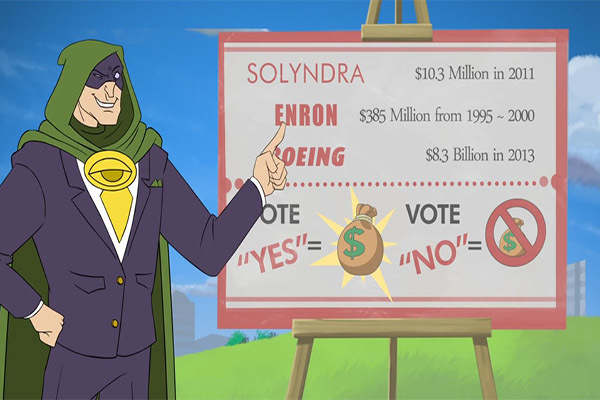As legislators in Congress debate whether or not to reauthorize the Export-Import Bank, the official export credit agency of the United States, it is extremely important that the facts surrounding the controversial government program be separated from spin and myths perpetuated by some of the program’s supporters.
Commonly called Ex-Im, the bank was established by executive order of President Franklin D. Roosevelt on February 2, 1934. Ex-Im provides loans and loan guarantees to U.S. companies attempting to export and to foreign companies wanting to import U.S. goods.
If Congress does not reauthorize Ex-Im by the end of September, it will cease providing additional loans or loan guarantees, but would continue to service existing loans.
Mythbusting
Let’s debunk three myths about Ex-Im which are running wild on Capitol Hill, and elsewhere.
Myth #1: 90 percent of Ex-Im loans go to small businesses. Based on the number of loans, almost 90 percent did benefit small businesses in 2013 (according to the bank’s very inclusive definition of “small”).
Based on the number of dollars loaned, the large majority of taxpayer-backed financing went to behemoth businesses. In fact, Congress requires 20 percent of the total dollar value of Ex-Im transactions to go to small businesses, but the bank has repeatedly failed to meet that number.
Myth #2: Ex-Im financing is necessary for American businesses to compete in the global market. In 2013, Ex-Im financed only 1.6 percent of U.S. exports.
Myth #3: Ex-Im is a “self-sustaining agency” that returns profits to the Treasury. While theoretically budget-neutral, this notion is perpetuated only through faulty accounting and misleading statistics. Ex-Im uses faulty accounting procedures, rather than fair value accounting to create an illusion of profits. The Congressional Budget Office estimates that Ex-Im costs taxpayers $200 million each year.
If we take a closer look at Ex-Im’s transactions, the bank’s financing becomes even more questionable. In many cases, large corporations benefitting from Ex-Im financing could have received loans from the private sector. In other instances, the Ex-Im-backed ventures were so risky that private lenders would not fund them. In either scenario, U.S. taxpayers should not be responsible for providing low-interest loans that are unnecessary or unlikely to be paid.
To demonstrate the true horror of what Ex-Im does with our money, the House Financial Services Committee created a blog series titled “Egregious Ex-Im Bank Deal of the Day.” Each weekday, the staff publishes another awful deal authorized by Ex-Im.
Risky Business
Remember Solyndra, the failed manufacturer of solar panels? After receiving $535 million from the stimulus package, Ex-Im officials decided the now-bankrupt company could use additional help, in the form of a $10.3 million loan guarantee for a foreign supermarket chain to buy Solyndra’s products.
In a recent deal, the Australian Roy Hill Iron Ore project received a $694 million loan from Ex-Im after the private market refused to offer financing. Not only are Americans funding this, without their consent to bear the risk, but the project will compete with U.S. mines, jeopardizing domestic jobs.
Possibly the most egregious deal yet has been $4.975 billion in direct loans to assist building Sadara Chemical Company, a project of Saudi Aramco, the state-owned oil company of Saudi Arabia.
If the Saudi Arabian government needs American exports for its pet project, they can likely finance those purchases without help from U.S. taxpayers.
Money and Politics
If those were not enough reasons to let Ex-Im’s authorization lapse, the bank’s transactions are fraught with bribery and cronyism.
Abengoa International, a Spanish green-energy company, managed to receive about $150 million in total loans from Ex-Im — to no one’s surprise — as former governor of New Mexico Bill Richardson sat on the board for both the company and the bank.
Four other Ex-Im officials are currently undergoing investigations of bribery and favoritism.
While Ex-Im is financing growth for our foreign competitors, including Russia and Brazil, the U.S. continues to experience economic and employment hardships at home. Rather than risking taxpayers’ dollars for the benefit of other countries, it is time to let the Export-Import Bank expire.
Melodie Bowler ([email protected]) is a Government Affairs Intern at the National Taxpayers Union. Used with permission of Government Bytes: http://www.ntu.org/governmentbytes/export-import-bank-a-bad-deal-for-taxpayers.html




